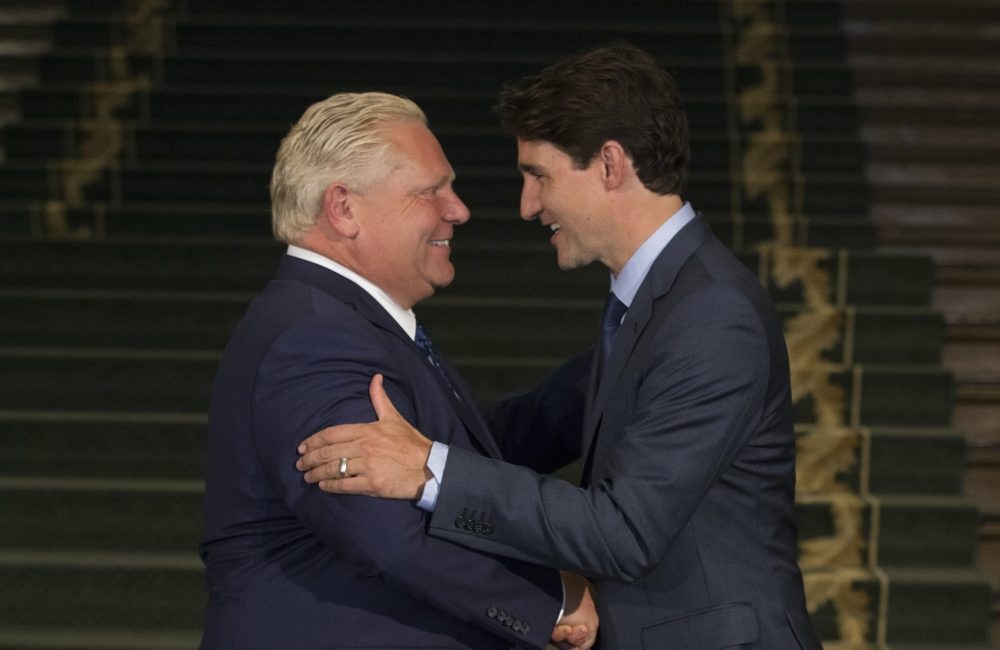International Obligations are Clarified for New Ontario Premiere
The first meeting between Prime Minister Justin Trudeau and Ontario Premier Doug Ford was anything but cohesive. Ford, quick to blame the Prime Minister for the influx in asylum seekers, expressed his distaste for the federal government’s commitments when it comes to refugees entering the country.
The Premier claims that the federal government is straining local and provincial resources and that Ottawa itself should cover all costs as they relate to the refugee crisis. In a highly questionable statement, he has also openly argued that Trudeau’s administration actually “encourages” asylum seekers to cross into Canada illegally.
Premier Ford commented, “This has resulted in a housing crisis and threats to the services that Ontario families depend on. This mess was 100 percent the result of the federal government, and the federal government should foot 100 percent of the bills.”
Federal Government Quick to Defend Stance on Policies
These allegations and statements garnered a response from the federal government.
The Prime Minister stated that Ford may not fully comprehend Canada’s international obligations with regards to asylum seekers. He took the time to explain to Ontario’s Premier how the system works and how Canada is obligated to react in these situations in hopes that he would see the relevance and importance of our nation’s responsibilities.
The federal government further defended its position by pledging to continue its ongoing efforts to relieve the burden incurred by Canadian provinces while simultaneously seeking Ontario’s continued support in helping refugees.
Backlash from Ontario
“[Trudeau] was the one who tweeted out that everyone was welcome here and as a result of that we’ve had thousands of people cross the border illegally and it’s putting a strain on many of our public resources,” said Lisa MacLeod, the provincial minister managing the immigration file.
Echoing Ford, she added that provinces and municipalities alike should not be burdened by the promises and comments made by the prime minister.
But what the provincial government doesn’t seem to comprehend is that Canada has an international responsibility to provide refugees with due process once they step on Canadian soil and claim asylum.
Trudeau’s own administration backed his stance on the issue. Ahmed Hussen, the Federal Immigration Minister, agreed with Trudeau’s sentiments, commenting that all levels of Canadian government need to work together to maintain commitments to treat asylum seekers with respect and dignity as they are processed through various programs and work their way into the system.
Hussen added, “We have international obligations, as well as domestic laws, to apply when it comes to asylum seekers. These are not optional issues. This is the law that we can’t just opt out of.”
It’s clear that the federal government is dedicated to protecting Canadians, the integrity of the immigration system, and its commitment to helping those seeking asylum in our country.
Funding Provinces with $50 Million
To offset the costs provinces sustained by the influx in asylum seekers entering the country from the United States, the federal government is sending $50 million in funding to Ontario, Quebec, and Manitoba.
But these provinces are asking for more support, stating that this figure is a fraction of what’s required.
Quebec claims its costs are actually closer to $146 million if future projections are factored in. Ontario claims the same, saying that they need at least another $64 million more to cover the finances incurred.
The federal government has agreed to send another $36 million to Quebec and $11 million to Ontario to help relieve these financial stresses.
Despite this effort to aid provincial governments while remaining dedicated to providing asylum for the influx in refugees entering the country, negativity persists on the issue from opposing parties.
It seems Premier Doug Ford and Prime Minister Justin Trudeau are leaders who are miles apart when it comes to international obligations and the overall view of Canada’s involvement with asylum seekers, leaving opposing parties in their wake to argue both sides of this prevalent issue.
Share this article
Arghavan Gerami
Arghavan Gerami is the Founder and Senior Counsel at Gerami Law Professional Corporation ('PC'), a full-service immigration law firm in Ottawa, Ontario. Since 2011, Ms. Gerami has focused her practice on immigration and refugee litigation. Prior to that, Ms. Gerami worked at the Ministry of Attorney General and the Department of Justice and had the privilege of serving the Honourable Mr. Justice M. Evans at the Federal Court of Appeal on immigration and administrative law appeals. Ms. Gerami contributes to the Immigration Law Section of the Canadian Bar Association, the Canadian Association of Refugee Lawyers, and the United Nations High Commissioner for Refugees. Ms. Gerami has also published numerous journal articles and presented at various immigration and refugee law conferences and events across Canada.

